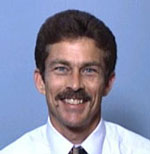Rick Grammier
Project Manager, Deep Impact

What's the coolest thing about the Deep Impact mission?
We will actually guide a projectile into a comet and learn more about its true nature and constituents. Hey, its kind of hard to hit something going 23, 000 miles per hour - imagine the brain power and test that goes into that!
Where do you work and why do you like it there?
I work at the Jet Propulsion Laboratory. It's a great work environment and continually provides opportunities to do things that have never been done before. You feel like one big family working together to solve really difficult but exciting problems that few people ever get the chance to address. There is always something to do and you aren't limited to any one particular area.
How did you end up working in space exploration?
I was working for a company in Arizona, in a non-space exploration role. I then had an opportunity to transfer to California with this same company, in a branch that was supporting the U.S. Air Force Space Command. I took the opportunity in order to return to college for my Masters degree and learn more about the space business. It opened up a whole new world for me and I jumped at the opportunity to go to work for JPL and continue in the space exploration field.
Who in your life inspired you?
Well, that's a hard one to answer because so many people have inspired me. First and foremost, it was my parents. They encouraged fantasy and science fiction reading as well as a healthy dose of sports. Also, there were the Commanding Officer at West Point and the many, many outstanding classmates that I had. That's where I learned you could always do more than you ever thought possible, and even more if you teamed and took care of each other. John Wayne, of course, was another because he was a great cowboy, gunfighter, army guy, and pilot. I think I've been lucky to know and be associated with so many fine, inspiring people.
What do you do in your spare time?
What spare time? I referee soccer and watch my kids play soccer. I love to work in my yard and garden. Reading for pleasure is a real luxury. I like to cook - - especially chili. If at all possible, we take the motor home out and hit the road. I also love camping and fishing with the boys (four of them), or hugging my daughter. Last but not least is spending some quiet time with my lovely, supportive wife who has put up with all my traveling so well.
Do you have a yet-to-be achieved life goal?
I'd like to retire at a young enough age to go out and see as much of the world as possible and see all that I can see. I've traveled a lot in my time, but there is so much more to see and explore.
How scientifically/technically oriented were you as a young person?
Very. My mother was a math teacher who actually worked with the monkeys used in the beginning of the space program before we started sending up people. She had a real influence on my ability to excel in math. I particularly liked math and chemistry in high school. But I also liked history, sports, girls, etc. It's important to understand that you don't have to like just one thing. I learned to like engineering in college, though I always thought I'd spend my career as an Army Officer rather than an engineer.
What is your position on the Deep Impact mission and what do you do?
I'm the Project Manager and basically oversee all the engineering and management tasks that are necessary to pull something like this off. The Principal Investigator, Mike A'Hearn from the University of Maryland, oversees all the science.
What was your favorite book when you were a child and why?
Now that is a hard one. It's a toss up between The Hobbit and the Lord of the Rings series (which I've read many, many times), or Robert Heinlein's Glory Road.
What did you want to become when you grew up?
Well, I wanted to be a career Army Officer. I had that goal and wanted to attend West Point, since I was about seven years old. After graduating from the Academy in 1977, I basically stayed in for about five years and then decided to try something different.
If you weren't working in space exploration now, what might you be doing?
I'd probably be working in some other type of development engineering field. I like the combination of management and engineering. That way I get to stay technically oriented while still exercising my people and leadership skills.
What do you most want to learn from the Deep Impact mission?
What's inside one of those dirty, icy rocks anyway?
What advice do you have for students who wish to work in space exploration?
Work hard at your education and don't limit yourself to excel in just one subject. Space exploration isn't limited to just a couple of areas and the possibilities are boundless. Explore different subjects and find out what you like and what resonates with you. Then, figure out where and how to apply it to your space exploration desires. You must like what you do, because you are going to spend a long time doing it. Listen to advice and think about it, but you must decide your direction. No one else can do that for you.











